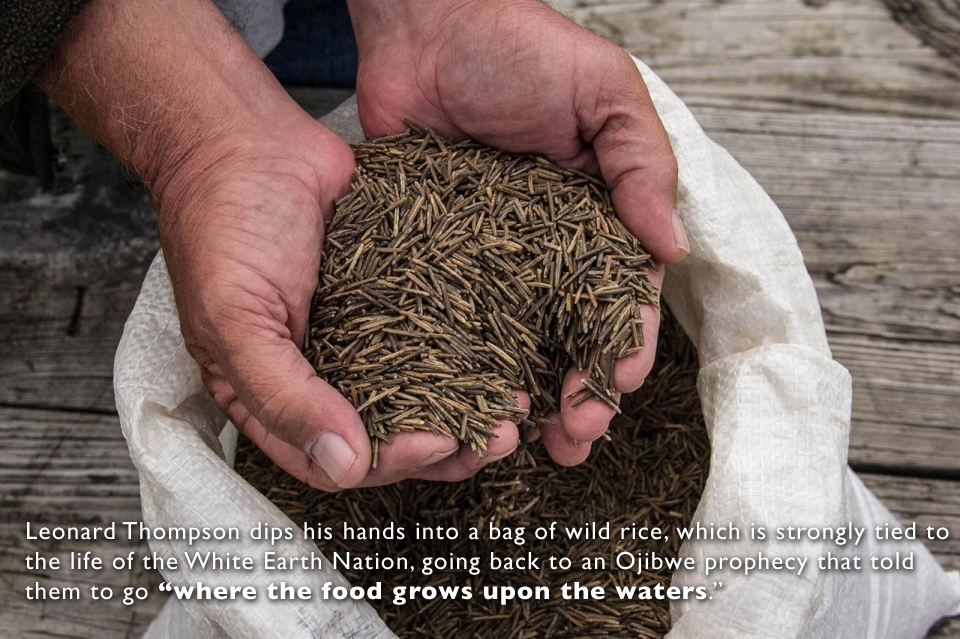
A few days before the bleak UN climate report was released, warning us how time is shrinking for humans to curb the climate crisis, Chippewa indigenous leaders presented a lawsuit on behalf of Manoomin, or wild rice. The lawsuit is making a last attempt to stop the construction of Line 3 oil pipeline by Enbridge corporation in Minnesota, which would increase two-fold the flow of tar sands oil from Alberta, Canada. In 2019, National Geographic called this industry the “world’s most destructive oil operation.”
For the past seven years, the Chippewa, Ojibwe, and Anishinabe people have been fighting to shut down the pipeline that threatens their water sources, wild rice, and our collective future, both through civil disobedience and by legal means. This new lawsuit against the Minnesota Department of Natural Resources (DNR) lists Manoomin as a plaintiff and is calling to revoke the permit granted to Enbridge on in June 4, to divert 5 billion gallons of water for pipeline construction–that is ten times more than what was originally requested, at 500 million gallons.
Under the rights of Manoomin tribal law, adopted by White Earth Band of Ojibwe in 2018, wild rice possesses inherent rights to exist, which include the rights to “clean water and freshwater habitat, the right to a natural environment free from industrial pollution, the right to a healthy, stable climate free from human-caused climate change impacts.” Manoomin, which grows on water, is a cultural and sacred food for indigenous people and part of their migration story. As told in the first couple of paragraphs of the lawsuit:
“Manoomin has been a part of our traditional stories, teachings, lifeways and spirituality since the earliest times to the present day. For the Chippewa Manoomin is alive like all living creatures and they are our relations. We Chippewa have a sacred covenant with Manoomin and the water (Nibi) and all living creatures, without which we cannot live. Manoomin’s story is revealed as part of our migration story and the Seven Fires Prophecy, which tells of the westward migration from the Atlantic coast, through the Great Lakes to our current homelands and territories of the Chippewas of the Mississippi.“
This is the second “rights of nature” lawsuit filed in the US in 2021; the first legal action was brought on behalf of Florida’s waterways, wetlands, and streams, from a large housing development project. Voters in Orange County, FL, adopted a rights-of-nature law through a referendum in the November 2020 elections.
At the heart of Manoomin’s lawsuit is a tremendous responsibility for protecting water sources and waterways during one of the worst droughts in Minnesota. In her report, “What Happens When the Water Goes Down?”, Renee L. Keezer with the White Earth Department of Natural Resources cites that more than half of the state of Minnesota is in severe drought, 4% in extreme drought. The ecological impacts of decreased water levels, worsened by extractive uses of waterways like Line 3 pipeline construction, can have devastating ecological impacts. Shallower waters create lower oxygen levels, prompts fish and vegetation die-offs, which become a source of greenhouse methane gas. Lower surface waters also increase the concentration of pesticide and chemical runoff pollution.
The report also cites a hog farm that was denied a permit in Minnesota in October 2020, because it would require using 15 million gallons of groundwater per year. “Why was this scientific approach not taken regarding the Line 3 dewatering permits? The amount of water siphoned from the unconfined aquifers for this project is over 300 times the amount requested for the hog farm,” asks Keezer.
“DNR is failing to protect freshwater resources for Manoomin and the rest of Nature’s creations, with callous disregard for the Rights of Nature, Rights of Manoomin and Rights of the Chippewas reserved by a series of 44 Treaties with the United States, simply to enable and facilitate climate change threats for a different, foreign, tar sands crude oil pipeline called Line 3 Replacement. DNR state oppression, and imperialism fosters and enforces cultural genocide in Minnesota,” state the plaintiffs in their lawsuit.
Intense flooding and extreme drought are two critical assessments of the Intergovernmental Panel on Climate Change (IPCC) report, which can be directly attributed to human influence. “Hot droughts” are expected to become more common around the world, according to climatologists who worked on the report. Every drop of water has become critical and should be treated as key to our survival.
Water defenders from Native and non-Native communities have been criminalized for their fight to shut down Line 3, with more than 600 arrested so far. In an interview with the New York Times, Winona LaDuke, Ojibwe and executive director of Honor the Earth, blamed the Biden administration for failing to withdraw federal permits for the Line 3 project, privileging a Canadian multinational over people’s survival. “Why do we get the last tar-sands pipeline, Joe?” said LaDuke. “I organized people to vote for Biden. I drove people to the polls through seas of Trump signs. I drove Indian people to vote who hadn’t voted in 20 years. And what did we get from Joe? A pipeline shoved down our throats.”
A series of actions have been planned for August 23-25 in Washington DC and in front of the Minnesota State Capitol to demand officials to cancel Line 3 immediately, a few days before its completion.
manoomin-et-al-v-dnr-complaint-w-exhibits-8-4-21

